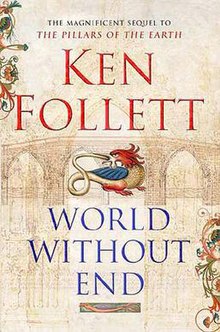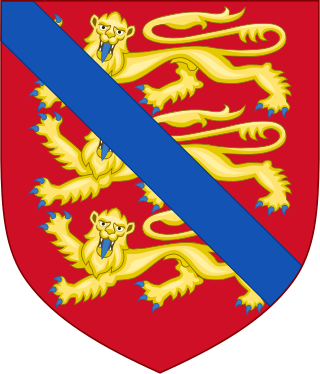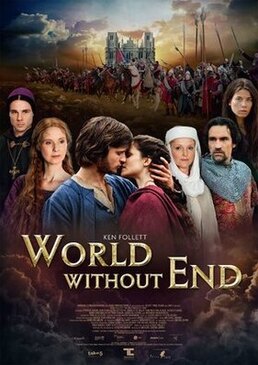Plot summary
The novel begins in the fictional city of Kingsbridge, England in the year 1327. Four children – Merthin, his brother Ralph, Caris, and Gwenda – head into the woods on All Hallows Day. Together the children witness two men-at-arms killed in self-defence by Sir Thomas Langley, aided by Ralph. The children then flee, with the exception of Merthin, who helps the wounded Sir Thomas bury a letter with instructions to dig up and deliver it if and when Sir Thomas should die. After this Sir Thomas flees to Kingsbridge and seeks refuge in the monastery, becoming a Benedictine monk, while the four children swear never to speak of what they saw.
During mass at All Hallows, Gwenda is forced by her father to steal the money that Sir Gerald was supposed to use to pay his debts to Kingsbridge Priory. Forced to default on these debts he is disgraced, his property confiscated and he and his wife are left as pensioners to the Priory. This disgrace drives their sons Merthin and Ralph to seek to regain the family's fortune and honour. Ralph is accepted as a squire under the Earl of Shiring, while Merthin is pushed to the far less prestigious role of apprenticing himself as a carpenter.
Ten years later, in 1337, Caris and Merthin are in love. When a section of the vault of the Kingsbridge Cathedral collapses Merthin, now an apprentice carpenter, shows his genius by developing a cheaper means of repair than his master.
Ralph, now a squire to Earl Roland of Shiring, provokes a fight and has his nose broken by a handsome peasant from Gwenda's village named Wulfric, for whom Gwenda has a hopeless infatuation. Gwenda is sold for a cow by her father to be prostituted at an outlaws' camp. She kills one of the outlaws while he is raping her, and escapes. She is followed by her buyer, but is able to drown him when the Kingsbridge bridge collapses, a tragedy that kills many, including all of Wulfric's immediate family and Prior Anthony of Kingsbridge (at the hands of Godwyn's mother). In the midst of the disaster Ralph saves Earl Roland's life and is rewarded with the lordship of Gwenda's village of Wigleigh.
Gwenda and Wulfric return to Wigleigh and attempt to gain Wulfric the inheritance of his father's land. The inheritance is eventually denied by Ralph because of the grudge he bears against Wulfric. Due to his poor prospects, Wulfric's beautiful wife-to-be, Annet, leaves him. By months of intensively showing Wulfric her love and devotion, Gwenda finally wins his love and they marry. Gwenda then tries to win Wulfric back his lands by having sex with Ralph, but Ralph does not uphold his end of the deal. Gwenda's first son, Sam, is conceived through this liaison.
Ralph, as lord, is merciless and brutal, and he winds up raping Annet as well. Wulfric does not permit this outrage to go unpunished, and lodges a complaint against Ralph with the Earl on her behalf; though English law of the time forbids rape regardless of the perpetrator's social status, it is very risky for peasants to sue their lord. Gwenda, despite her consternation at her husband's defence of his former sweetheart, helps by interceding with Lady Philippa about Ralph's case. Thanks to her intervention, Ralph is convicted of rape and is sentenced to hang, but with the Earl Roland's connivance, he manages to escape and becomes an outlaw. After robbing and murdering many people on the road to Kingsbridge, he is eventually captured with Merthin's help, and is once again set for execution, but since Edward III of England has declared war on France (launching the Hundred Years' War in May 1337) he is granted a royal pardon on condition that he fight in the war (in 1339, when Edward invades northeast France).
Meanwhile, the monastery's Sacrist, Godwyn, a nephew of Prior Anthony, outwits his opponents and wins the priory election in an overwhelming victory. Godwyn claims to be a reformer, but turns out to be even more conservative and quickly begins to clash with the townspeople on a number of issues, including the funding and building of a fabulous new bridge designed by Merthin and permitting the townspeople to full wool for a growing fabric industry. Caris, who becomes the de facto alderman, is a particular problem, leading the campaign to get for Kingsbridge the status of a Royal Borough and emancipate the townspeople from the Priory's control. Despite being her cousin, Godwyn charges Caris with witchcraft hoping to have her executed to get her out of the way. To escape execution, Caris agrees to join the Kingsbridge nunnery. With his planned marriage to Caris thus denied, Merthin leaves Kingsbridge for Florence, Italy to pursue his building career. He becomes a highly successful and rich architect, and after hearing that Caris had taken nun's vows he marries Sofia, the daughter of one of his Italian clients.
Eight years later (in 1346), Godwyn steals money from the substantially more profitable nuns in order to build for himself a luxurious palace. In July 1346, Caris seeks to petition the bishop to redress this theft. However, by this time the bishop has left for France with King Edward III. Caris travels to France with Mair, an attractive nun from the convent who has romantic feelings for Caris; during their travels they start an intimate relationship, although Caris feels guilty that she still cares more for Merthin. Along the way, Caris witnesses the ravages of the war and acts as a field nurse during the Battle of Crécy, during which Ralph, having fled charges of rape and murder in England, saves the life of the Prince of Wales and is rewarded with his lifelong dream of knighthood. Caris's errand is fruitless, however, as the bishop of Kingsbridge as well as Earl Roland have been killed in the battle.
In Florence, the city is ravaged by the Black Death, which had arrived in Messina in 1347. Merthin and his entire family are stricken, he recovers in the spring of 1348 but his wife dies. He remembers his love for Caris and decides to return to Kingsbridge with his daughter Laura (Lolla). There he finds Caris unwilling to renounce her vows but the two go through a sporadic liaison. At the same time, Merthin re-establishes himself in the community by solving flaws left in the new bridge during its completion after his departure.
Soon after Merthin's return, the plague reaches Kingsbridge and thousands die, and the city quickly descends into anarchy; this includes Caris' intimate partner, Sister Mair. Godwyn loses his nerve and flees with the monks to an isolated chapel where he and all the monks die except for Gwenda's brother Philemon, who fled, and Thomas Langley. After the prioress of the nunnery dies Caris is elected Prioress and promoted acting Prior in the absence of Godwin, and she institutes the use of masks and cleanliness which help to protect the nuns from the plague. With social mores loosened under the devastating effect of the plague, Caris regularly breaks her vows as a nun and for some time lives openly with Merthin; the townspeople, grateful for Caris tireless efforts, tolerate this, as does the pragmatic Bishop who himself has a long-standing homosexual relationship with his archdeacon. But the returning Philemon starts denouncing Caris, who must drop Merthin in order to continue her monastic and medical work. The disappointed Merthin angrily tells her he would not wait any more, but would find another love.
After William, the new Earl of Shiring, dies from the plague along with all his male heirs, Ralph sees a chance to become Earl. After murdering his young wife Matilda (Tilly) he arranges his marriage to William's widow Lady Phillipa, whom he has long desired, and makes himself Earl. However Philippa spurns him and leaves for the Kingsbridge nunnery, where she and Merthin fall in love in 1350 and she conceives his child. Afraid of Ralph's wrath, Philippa seduces Ralph to make him believe the child is his. As a result, Merthin and Philippa cannot continue their liaison.
After two years, the plague dissipates and Caris renounces her vows, after finally being able to run her own independent hospital, and marries Merthin. After ten years of hardship, the people of Kingsbridge are granted a borough charter, freeing them from the lordship of the priory, and Merthin becomes alderman. Merthin also solves the long troublesome problem of why the vault of the cathedral collapsed by dismantling and rebuilding one of the towers which he redesigns to be the tallest building in England. Although Ralph continues to harbour a grudge against Wulfric, he is forced by the labour shortages caused by the plague to allow Wulfric to regain his father's land. When Sam, the secret son of Ralph, kills the local bailiff's son and is sentenced to death, Gwenda reveals his true parentage to Ralph to gain Sam's release. Armed with this knowledge, Ralph blackmails Gwenda into having sex with him again. When Sam walks in on this, there is struggle in which Sam and Gwenda kill Ralph. Davey, Gwenda's second son, negotiates a free tenancy and marries Amabel, the daughter of Wulfric's former wife-to-be, proving to Gwenda that her life has had some worth.
Gwenda's conniving brother Philemon becomes Prior of Kingsbridge and even tries to become Bishop, but his ambition is ruined after Sir Thomas Langley dies of old age. Merthin keeps his promise and digs up the letter which reveals that the deposed King Edward II had secretly survived and had taken the identity of one of his attackers. Merthin trades the letter to a member of the king's court in exchange for Philemon's departure from Kingsbridge forever.
As the plague comes back, Caris's intelligence, practical sense and determination allow the townspeople to subdue this second outbreak, making her the most popular and revered figure in Kingsbridge. Merthin completes his spire and succeeds in making Kingsbridge cathedral the tallest building in England. He tops the spire with a statue of an angel modelled on Caris.













